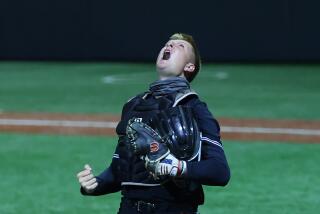Diamonds Are Teen’s Best Friend : Coach Uses Baseball to Get Youths Off Drugs, Alcohol
- Share via
For the past eight years, Joe Triana has worked to get teen-agers off the streets, off drugs and alcohol and onto the right track.
As a youth counselor in Carson, he has spent time in the trenches with misguided teens, giving advice and trying to solve problems.
If the youngster happens to throw a wicked slider, Triana has something else to offer--a uniform.
Triana, 31, manages the South Bay Blue Jays, a Torrance-based semipro baseball team. And while it should be made clear that Triana’s team is not a haven for misfits and incorrigibles, he is able to mix his counseling and baseball experiences compatibly. The Blue Jays are a team of serious athletes, whether they be college players trying to catch the eyes of scouts or off-season minor leaguers trying to stay in shape.
There are dozens of semipro teams in Southern California, but Triana’s is unique in that he offers a second chance to some players.
“A lot of times, we’re not just a second chance,” he said, “we’re the only chance.”
Triana played high school baseball at St. Anthony in Long Beach, college ball at Harbor, Long Beach City and Cal State Long Beach and later kicked around the Mexican League for three seasons.
Playing for the fun of it, Triana realizes he has no chance of again playing professionally.
“I’m running the team just because it’s fun,” he said. “Plus, I don’t want to see younger players get messed over like some of my friends did when we were in college. We try to do things for guys who aren’t getting a fair shake in college. They’re not ready for pro ball, so they come to us. We try to get them into pro ball or back into school, into college somewhere where they are going to get a chance to play.”
Harbor College pitcher Robert Small, who played for the Blue Jays, recently accepted a baseball scholarship to Chico State.
“I’ve been doing this for about seven years,” Triana said. “Players come to us because I do know a lot of baseball people--scouts, college coaches--that I have either played for or have been in contact with.”
One notable former Blue Jay, DeWayne Buice, is a member of the California Angels. In its infancy, another Angel, Chili Davis, worked with the team.
The Blue Jays, who play all year, have two loose affiliations, one with the National Baseball Congress, the other with the Stan Musial League. The South Bay club is not in a league, playing as an independent. Players are not paid. In fact, most pay to play.
“The financing, we mostly do it on our own,” Triana said. “I do it myself or with some of the older players. Some of the guys are in their 30s and have pretty good jobs, and they pitch in when they can. Then we charge each player $30 to put in a fund to have money ready to get into tournaments. We use some to buy balls and equipment, and we make some money winning tournaments. Basically, we just try to break even.”
Triana said he is in the process of writing proposals for financial backing. Regardless, he said, the Blue Jays will continue to play.
“Ideally, I’d like to make it easier on the ballplayers,” he said. “That way, all they have to worry about is playing ball or getting into a good school. That way they don’t have to worry about anything financially.”
The Blue Jays is not a team consisting solely of college-level players. Until last year, Triana played on the team. “I kind of let myself go and put on a few pounds, but I’m going to take it off and play again,” he said.
Matt Goldfield is also 31 and has no delusions about playing professionally.
“I play just to play,” Goldfield said. “It’s an addiction.”
That’s an addiction Triana is happy to there is another he doesn’t like and sees all too often.
“A lot of times,” he said, “a guy will come in and his head is real messed up. If we detect any problem as far as drugs or alcohol, we will work on that area with a player and will refer him to a place where he can learn to help himself.
“A lot of guys, when things aren’t going so good in ball, will turn to drugs or alcohol. I’ve seen it a lot, especially in younger players. We try to watch out for that.”
The Blue Jays, Triana said, play three times during a “good week” but at times have to settle for intra-squad games. There are no scheduled practices, which means time spent with players is short.
“A lot of the guys playing for us, including myself, have been through the mill,” he said. “We can help straighten younger players out. We will let them know that they have talent, will tell them that they do have talent. If they have been cut from their college team, we will tell them not to take the word of just one coach.
“There is one issue we like to push. We tell players to believe in themselves and, if they do, to go for it. Go for it now and not be frustrated 10 years from now.”
More to Read
Go beyond the scoreboard
Get the latest on L.A.'s teams in the daily Sports Report newsletter.
You may occasionally receive promotional content from the Los Angeles Times.










